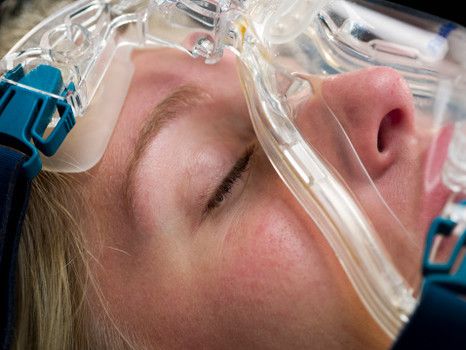Obstructive sleep apnea is a potentially serious sleep disorder in which breathing repeatedly stops and starts during sleep. More than 18 million American adults are affected by this disorder. If left untreated sleep apnea can result in numerous health problems. However, sleep apnea in women is often misdiagnosed or never addressed. The body’s autonomic responses, autoregulatory functions that keep us alive which include changes in heart rate, blood pressure sweating and pupil dilatation. These responses appear to be greatly impaired in women.
Dr. Paul M. Macey, PhD, Associate Dean for Information Technology and Innovations, Department of Neurobiology, David Geffen School of Medicine, lead author of this new study by UCLA researchers, commented “We now know that sleep apnea is a precursor to bigger health issues.” And for women in particular, the results could be deadly.”
In this new study researchers assessed heart rate response in obstructed sleep apnea (OSA) in comparison to healthy participants to autonomic challenges, and, separately, characterize female and male patterns.
This study included 94 participants that included 37, newly diagnosed, untreated OSA patients; six females’ average age 52.1 years and 37 males, average age 54.3 years and 57 healthy control participants; 20 female’s average age 50.5 years and 37 males 45.6 years. The OSA patients had been recruited from the UCLA Sleep Laboratory, and control subjects from the Los Angeles community. The OSA patients were classified as moderate or severe, based on an AHI (apnea-hypopnea index) of 15 events/hour or higher. Control participants reported good health, and no sleep disorders. All control subjects were administered a screening survey for the presence of symptoms possibly from OSA.
No subjects had a history of psychiatric disorders, cardiovascular disease, stroke, or other major illness. Control participants were recruited via fliers and word-of-mouth on the university medical center and campus. No OSA or control participants were using medications that could affect autonomic function, such as psychotropic or cardiovascular agents.
The team set out to describe heart rate responses to three autonomic challenges in OSA and control populations, with additional separation by sex.
All participants had their heart rate responses measured during the performance of three physical tasks;
The foot cold pressor challenge elicits both a blood pressure rise through temperature stimulation; subject’s right foot is put in almost-freezing cold water for a minute.
The hand grip which causes a rise in blood pressure from activation of the hand muscles and voluntary effort, participants squeeze hard with their hand.
The Valsalva maneuver which causes a sequence of blood pressure changes including a rapid increase in pressure, and upon air pressure release, a rapid decline, and then recovery. Participants breathe out hard while the mouth is closed.
In all three tests, changes to the normal heart rate were lower and delayed in patients with obstructive sleep apnea, compared with healthy controls. OSA females showed greater impairments than OSA males.
In their discussion the team writes “Heart rate responses to autonomic challenges are disrupted in OSA patients, and the patterns of alterations differ between the sexes. The common pattern of heart rate differences in OSA was a reduction in magnitude of responses, and a delayed, or slower rate of change in those responses. A post-hoc separation by sex highlighted the differing female and male patterns in healthy control subjects, as well as the different amplitude and time-courses of OSA-control effects within sexes, with female patients showing greater impairments from their male counterparts.”
“Heart rate responses are blunted and delayed in OSA patients; those differences are exacerbated in females,” the team writes in their conclusion.
According to Dr. Macey, The heart-rate results for these tests show that the impact of sleep apnea, while bad in men, is more severe in women.” “This may mean that women are more likely to develop symptoms of heart disease, as well as other consequences of poor adaptation to daily physical tasks. Early detection and treatment may be needed to protect against damage to the brain and other organs.”
The next step in the research is to see if the autonomic responses improve with treatments such as continuous positive airway pressure (CPAP), the usual sleep apnea therapy, in which a machine is used to help an individual breathe easier during sleep. Researchers also intend to investigate the affect of other treatments.
All procedures were in accordance with the Declaration of Helsinki and approved by the UCLA Institutional Review Board, and subjects provided written, informed consent.
This study appears in the peer-reviewed journal PLOS ONE.








